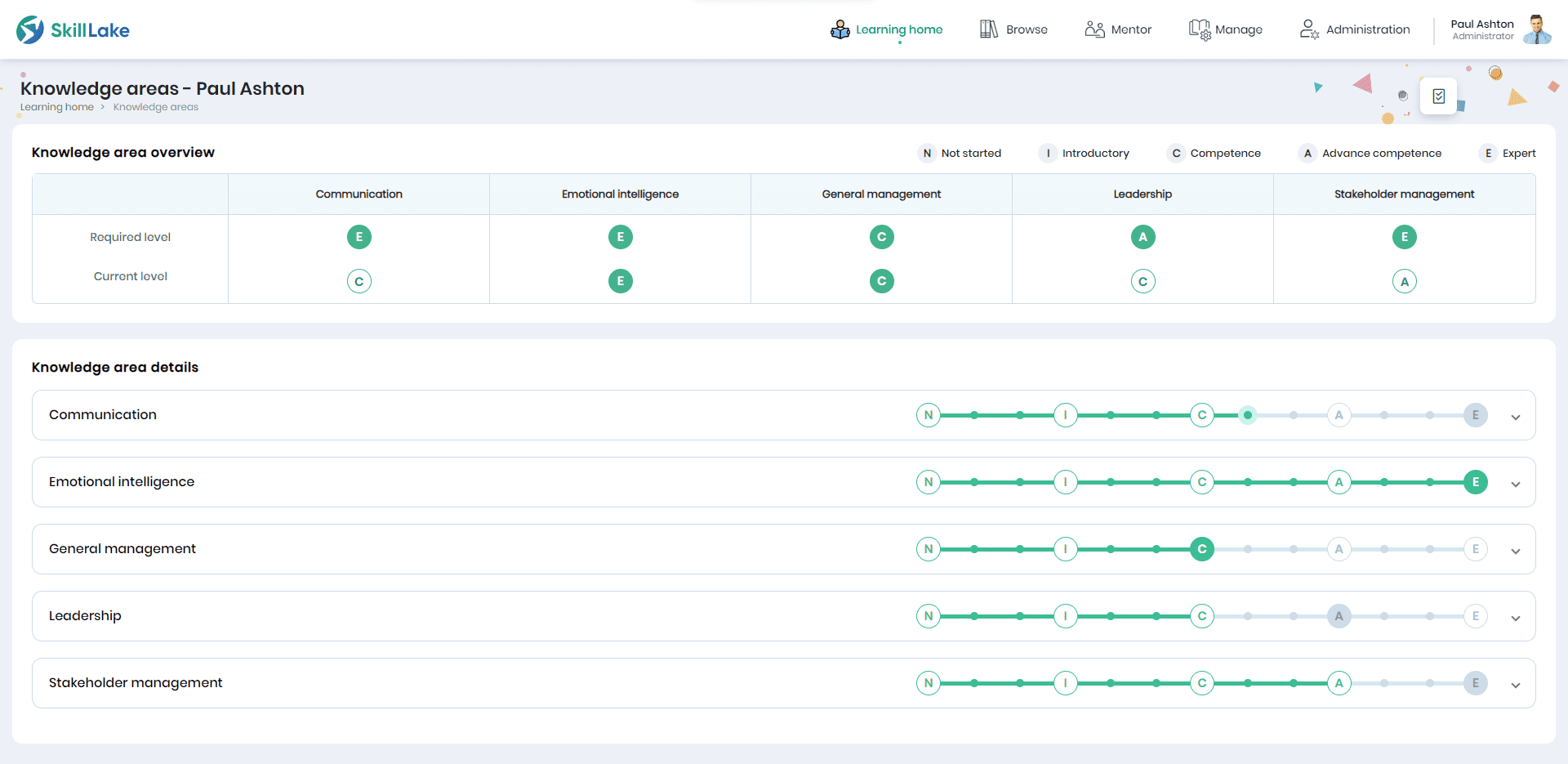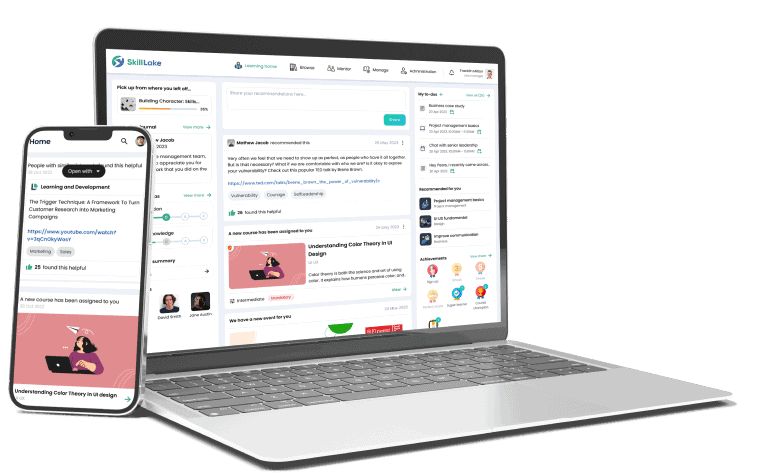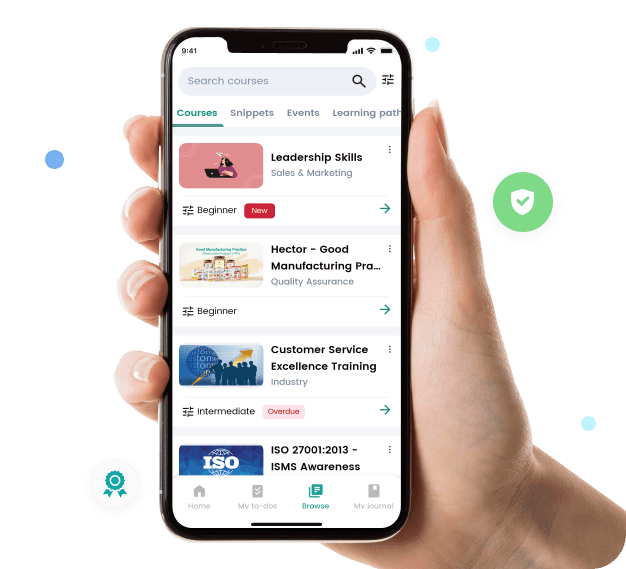Boost Sales & Customer Service: The Secret Sauce of Retail LMS

Imagine a retail team brimming with confidence, effortlessly navigating product details, and exceeding customer expectations. It is going to make customers satisfied and return to you. How can you equip your employees to be exceptional? With proper training, you can ensure your team has an in-depth understanding of your products and services, and a retail LMS (Learning Management System) can be a game-changer in achieving this goal.
Employees who receive training become confident and efficient and can deliver exceptional customer service. As a result, trained employees become brand champions. When employees are trained and confident, they create a smooth shopping experience for customers, eventually boosting sales and profitability.
While training has many advantages, it is a hectic task. Providing regular training for large-scale employees is cumbersome, time-consuming, and costly. Ensuring these trainings are engaging and enjoyable for the employees is also imperative. Strategic planning, appropriate training techniques, and continuous assistance can help resolve these issues. An LMS with robust features that help align individual growth with company objectives can enhance employee efficiency and confidence. This blog will explain how a modern LMS system improves employee training.
How Does an LMS Improve Retail Training?
A Learning Management System (LMS) can significantly improve retail training in several ways.
1. Anytime, Anywhere, Training
A mobile LMS allows employees to attend training at their convenience. Employees can view training materials and courses whenever they are most suitable, whether at home, on their commute, or during office breaks. This adaptability meets a diverse workforce’s varied learning styles and lifestyles and promotes ongoing learning and development.
2. Centralized Learning Management System
An LMS offers a centralized platform where all courses, training materials, and performance data are kept in one convenient space. Every employee will have consistent access to the same excellent training materials. Additionally, it simplifies training initiatives’ tracking, administration, and management. The platform also makes it easier and more efficient for managers to implement, oversee, and adjust training initiatives in response to the retail company’s and its staff’s changing needs.
3. Cost-effective Training Options
Using an LMS can save the retail industry a lot of money. Conventional in-person training sessions can incur costs for renting a location, transportation, printed materials, and occasionally outside trainers or facilitators. Many of these expenses can be cut or eliminated with an LMS. Retail companies can provide uniform training materials to staff members at various locations without requiring them to be physically present. Once created, digital modules can be reused repeatedly, providing scalability without correspondingly rising costs. This ensures that employees receive the best training possible while staying within budgetary constraints by enabling retailers to offer comprehensive training programs without a hefty price tag.
4. Reduced Employee Attrition
LMS facilitates tailored training plans that advance employees’ professional aspirations and the company’s goals. Utilizing an LMS to assist with employee development improves their skills and helps the organization retain top talent.
5. Excellent Customer Support
Maintaining customer service is crucial in the retail sector. LMS offers personalized learning, and with thorough and thoughtfully created training programs, staff members can fill the gaps and become more confident.
6. Evaluate Employee Performance
An LMS enables businesses to diligently track and assess the performance and progress of each learner. It helps managers find knowledge and skill gaps within their teams by giving them access to comprehensive analytics and reporting tools. This guarantees that employees consistently deliver their best work by promptly addressing any areas needing further attention or upgrading. Thus, to ensure that future training strategies and content are precisely targeted to meet the changing needs of the workforce, learner performance data will be helpful.
Essential Features for Retail LMS
1. End-to-End Learning Platform
Ensure the platform you select for your training can effectively manage the complete online training cycle, from selecting training materials to distributing them to students and monitoring their progress.
2. AI/ML Powered Course Recommendations
The learning management system (LMS) should examine user behavior and preferences using artificial intelligence and machine learning. This feature ensures the tool can create courses catering to specific career roles and learning objectives.
3. Courses with Immersive AR/VR Experiences
AR and VR offer a unique blend of safety, affordability, engagement, and effectiveness that traditional training often lacks. So, choose an LMS that can offer AR/VR Experiences.
4. SCORM-Compliant LMS
An LMS that complies with the SCORM (Sharable Content Object Reference Model) guarantees the smooth integration of e-learning content and authoring tools. This makes creating, sharing, and tracking standardized educational resources simple.
5. Competency Management & Mapping
The LMS should enable retailers to define, track, and assess employee competencies, mapping them to specific job roles and performance objectives to ensure that training efforts align with organizational goals.
6. Learning Path
When an LMS provides a personalized learning path, users can tailor learning materials to their roles, skill sets, and career goals. Thus, keep this feature in mind when searching for an LMS.
7. Interactive Feed
You should choose an LMS with an interactive feed, as this feature improves engagement and makes learning even more enjoyable.
8. Multiple Learning Modes
Selecting an LMS that offers a variety of learning modes, such as videos, interactive modules, quizzes, and more. It is crucial since learners have varying preferences and learning styles.
9. Streamlined Course Management
Simplifying the creation, management, and updating of training courses and materials ensures efficiency and agility in delivering relevant content to employees according to their evolving needs.
10. User Management
An LMS should allow administrators to efficiently manage user accounts, permissions, and access levels. This ensures employees can access training materials and resources based on their roles and responsibilities.
11. Gamification
Gamification elements make learning more enjoyable. Ensure that the LMS you choose offers badges, leaderboards, and rewards.
12. eLearning Mobile App
The LMS should provide a mobile app so learners can learn anytime, anywhere, and efficiently manage their hectic schedules.
13. Learning Byte
Learning bytes offer a convenient, engaging, and effective way to deliver bite-sized learning experiences. So, an LMS with a learning byte feature is an added advantage.
14. Tracking & Reporting
Tracking and reporting help you get the most out of your training programs. An LMS with this feature tracks learner activity and analyzes the data so you can ensure that your training is practical, engaging, and meets learners’ needs.
15. Flexible Cloud Hosting & Branding
Cloud-based hosting offers scalability, accessibility, and cost-effectiveness. At the same time, customizable branding options allow retailers to align the LMS interface with their corporate branding and identity.
16. Integration with Learning Content Platforms
Seamless integration with external learning content platforms and repositories enables retailers to supplement their in-house training content with various third-party resources and materials.
17. Learning Journal
A personal learning journal feature allows employees to reflect on their learning experiences, facilitating self-directed learning and growth.
18. Books & SOP
Incorporating digital libraries or repositories for standard operating procedures (SOPs), manuals, and reference materials ensures easy access to essential resources and guidelines for performing various tasks and processes in the retail environment.
Why Skill Lake?
Skill Lake provides a comprehensive and tailored solution for retail training. It combines advanced technology with personalized learning experiences to meet the unique needs of retailers and their employees. Skill Lake’s LMS effectively manages the complete online training cycle, from selecting training materials to distributing them to employees and monitoring their progress. It utilizes artificial intelligence and machine learning to examine user behavior and preferences, creating personalized course recommendations aligned with specific career roles and learning objectives.
Skill Lake integrates AR and VR technologies into its courses, offering a unique and engaging learning experience that enhances safety, affordability, and effectiveness. Since it is SCORM-compliant, it ensures seamless integration of e-learning content and authoring tools for simplified course creation, sharing, and tracking. The system enables retailers to define, track, and assess employee competencies, aligning training efforts with organizational goals and specific job roles. It also offers personalized learning paths, allowing users to tailor learning materials to their roles, skill sets, and career goals.
The interactive feed incorporates gamification elements like badges, leaderboards, and rewards, enhancing engagement and making learning enjoyable. It also provides a mobile learning app, enabling learners to access training materials anytime, anywhere, and efficiently manage their schedules. The learning bytes for convenient, bite-sized learning experiences and incorporate a personal learning journal feature for employee reflection and self-directed growth.
The flexible cloud-based hosting ensures scalability, cost-effectiveness, and customizable branding options to align the LMS interface with corporate branding. The platform seamlessly integrates with external learning content platforms and repositories, allowing retailers to supplement in-house training content with various third-party resources.
Want to see it in action? Book a demo
Build a culture of continuous learning with Skill Lake’s state-of-the-art people development platform. Give your employees professional training to help them excel in their job roles and propel your business to greater efficiency and success.
Start Today





Roshna R
Roshna is a passionate enthusiast of all things about learning and development. She has an innate flair for crafting thoughtful content and is inspiring eager minds on their learning journey.